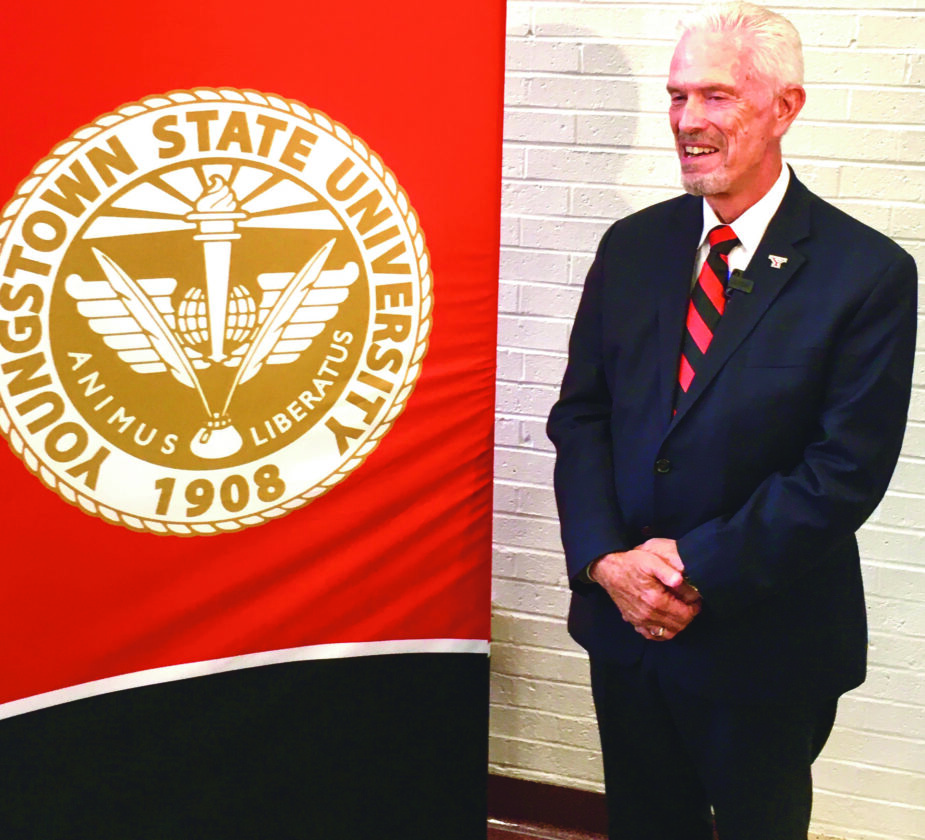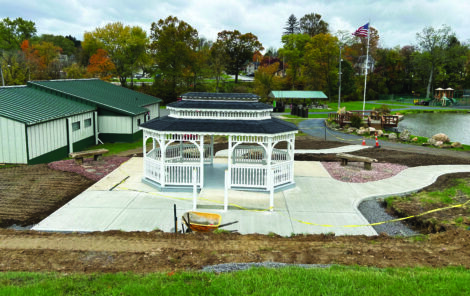YSU President Bill Johnson delivers his first State of the University address

Youngstown State University President Bill Johnson delivered his first State of the University address Tuesday in YSU’s Ford Theater. (Photo by Sean Barron)
YOUNGSTOWN – When it came to assessing Youngstown State University’s financial and enrollment situations, YSU President Bill Johnson wasn’t shy about cutting to the chase.
“YSU is in a really good place,” Johnson said during his first State of the University address Tuesday morning in the university’s Ford Theater. “There’s a feeling of optimism in the air.”
A key reason to feel hopeful for the university’s future is its finances, two-thirds of which come largely from financial aid and tuition and the rest from state funding, amid a market that is continually changing and shifting, he noted.
“Let me assure you, as I stand here today, that YSU is financially sound,” Johnson told a packed auditorium of several hundred students, administrators, faculty members and others.
During his one-hour presentation, Johnson outlined several goals he wishes to achieve, amid various challenges YSU and other institutions of higher learning face, beginning when the fall semester gets underway Monday. (8/26)
Johnson, who began his presidency Jan. 22, said his primary objectives are to have YSU be the anchor university in northeast Ohio and improve student experiences so they will further trust their futures to YSU. Along those lines, it doesn’t matter how or why they come to the university; what’s important is that they have the tools for success, he said.
“I want us to lead, not follow,” the president said, noting that integral to the university’s vision statement is to “be an institution of opportunity. YSU inspires individuals, enhances futures and enriches lives. We’ve been doing that for a long time; we’re going to continue doing that on steroids as we move forward.”
Johnson said that Jennifer Pintar, provost and vice president of academic affairs, is collaborating with faculty, staff and YSU’s Academic Senate to develop an academic master plan to give students the “primary product” of a solid education. Comparing YSU to a manufacturing company and her role to a plant manager, Pintar is tasked with understanding students, working with businesses that need what they will have to offer and leading the “design and development” of educating students for the workforce. It’s also vital she works to “manage the assembly line” of delivering that education, with university-wide support, he said.
As for bettering student experiences, Johnson said that work is continuing on a major renovation project to Kilcawley Center, estimated at $40 million. The building, which serves as a hub for student services and retail businesses, was finished in the 1960s but hasn’t undergone such work since at least the late 1970s.
Steps Johnson said he takes to enhance such relationships with students are to welcome them to the university, but challenge them to embrace the goals of completing their degrees while avoiding quitting in tough times. He also makes students with whom he meets aware of available faculty and advisors to help them graduate and avoid amassing large amounts of debt, to which financial advisors are on hand to guide them to ways to defray costs, such as financial aid and paid internships, Johnson said. He added that YSU has the state’s third-lowest tuition among four-year universities.
Johnson said he also discusses with students how YSU and area businesses and industries are connected. In addition, he shares with them ways they can receive scholarships in their areas of interest, and hopes they will stay in the Mahoning Valley to work and raise families, Johnson said.
Efforts also are underway to develop a Fall Leadership Series to survey the campus and collaborate to bring in various speakers, as well as to improve the advising process for students. Some of them have expressed umbrage with having multiple advisors, a situation that makes it harder to formulate a clear view and path forward, Johnson explained.
“It’s not a people problem; it’s a process problem,” he said, adding that work is being done to simplify it.
In addition, Johnson discussed an innovation investment fund, to span a single academic year, to provide opportunities for greater interdisciplinary collaboration “to explore, assess or implement innovative strategies” regarding teaching and learning, with a connection to artificial intelligence, along with student attraction to programs related to degree completion and career success.
Another key goal is to increase enrollment – something Johnson called “the elephant in the room.” YSU has about 11,000 students and has seen a 6% increase over last year, he noted.
Nevertheless, YSU, like most universities across the country, faces stiff competition toward student enrollment and retention – chief among them being an annual population decline, which translates into a shrinking number of potential YSU students, Johnson said, adding that home-schooling has increased 50% in the last six years.
Compounding the problem is a “false narrative” from some who espouse the view that higher education is no longer needed and is too costly. Nevertheless, 68% of those in a recent Gallup poll survey said they have some or high confidence in the value of a higher education, Johnson said.
Vital ways YSU needs to continue to increase enrollment are to cast a wider net via using tools and methods that will resonate with potential students, as well as to be competitive via managing its cost structure, “because the vultures are circling,” he said. Also, YSU must further tailor its programs to what area business and industry communities need and seek, he said.
“We must be nimble, flexible, adaptable and agile, because workforce needs in this ever-changing and technologically advancing global economy are like shifting sands under our feet,” Johnson said, adding that YSU is greatly expanding its offerings to meet that challenge.
To that end, work continues to be underway to absorb students who were disenfranchised and negatively impacted when Eastern Gateway Community College closed. Pintar and other YSU officials have worked to add more than 60 new EGCC programs, including those geared toward the aviation and transportation industries, he noted.
More work needs to be done, however, before YSU begins to establish its footprint and offer classes at EGCC’s Steubenville location, Johnson said.
This fall, YSU prototyped a new Penguin Prep program, for area students who might be “borderline” with their test scores and grade-point averages for acceptance at YSU. The university worked with local school districts to identify such students, then enroll them in this summer’s mentoring program with YSU’s honors team to help them develop the confidence to know they can have what’s needed to handle college life, he explained.
In addition, YSU ‘s outreach includes expanding efforts to reach those serving in the military as well as reserve officer reserve training corps programs, Johnson said.
The university also intends to increase enrollment and remain competitive via adapting a multi-focused philosophy that encompasses balanced online and in-person offerings, said Johnson, who dispelled rumors that YSU is heading toward being an online-only university.
Johnson also talked about two additional initiatives to improve enrollment: an enterprise enrollment project and standing up of YSU’s strategic communications function. The underlying thrust is to synergize all aspects of enrollment while adjusting to the needs of a diverse student body, and to effectively communicate those and other related purposes for doing so to synergize YSU’s marketing, communications, branding, advertising and local and national media relationships, he noted.
Other goals Johnson highlighted were to seamlessly integrate and pivot YSU with businesses and industries locally, statewide and nationally to better understand their needs and workforces, something he called “a constantly evolving goal,” as well as to ensure YSU has a stronger voice at the table to influence funding and policy decisions in Columbus and Washington for needed resources.
To meet the latter objective, Johnson and other YSU officials worked shortly after he took office to establish a government-affairs operation to advocate for those needs, he noted.
Even though YSU faces various difficulties and uncertainties moving forward, its staff, professors and other stakeholders remain committed to upholding high standards and improving the lives of students, Johnson said.
“In spite of our challenges, we have many pockets of excellence,” he added.
Johnson also touted numerous accomplishments among YSU’s seven colleges and its academic programs.



